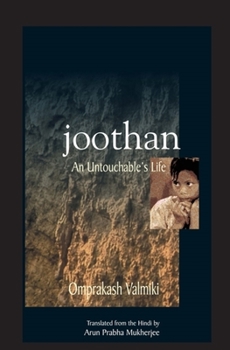Joothan: An Untouchable's Life
Select Format
Select Condition 
Book Overview
Omprakash Valmiki describes his life as an untouchable, or Dalit, in the newly independent India of the 1950s. "Joothan" refers to scraps of food left on a plate, destined for the garbage or animals. India's untouchables have been forced to accept and eat joothan for centuries, and the word encapsulates the pain, humiliation, and poverty of a community forced to live at the bottom of India's social pyramid. Although untouchability was abolished in 1949, Dalits continued to face discrimination, economic deprivation, violence, and ridicule. Valmiki shares his heroic struggle to survive a preordained life of perpetual physical and mental persecution and his transformation into a speaking subject under the influence of the great Dalit political leader, B. R. Ambedkar. A document of the long-silenced and long-denied sufferings of the Dalits, Joothan is a major contribution to the archives of Dalit history and a manifesto for the revolutionary transformation of society and human consciousness.
Format:Hardcover
Language:English
ISBN:0231129726
ISBN13:9780231129725
Release Date:August 2003
Publisher:Columbia University Press
Length:208 Pages
Weight:0.83 lbs.
Dimensions:0.8" x 6.3" x 8.5"
Grade Range:Postsecondary and higher
Customer Reviews
1 rating
Powerful account of oppression and resistance
Published by Thriftbooks.com User , 16 years ago
This is one of the most compelling of many Dalit autobiographies that have been written. Omprakash Valmiki was born into the Chuhra caste, one of the very lowest of the Dalit castes; the traditional professions for Chuhras, Bhangi, and other equivilent castes have been defined by the caste system in India as sweeping and manual scavenging; members of these castes have been considered "untouchable" even by other Dalits. However, this book shows how Omprakash Valmiki, with many of his colleagues, learned how to resist the oppression and degrading treatment that they received every day. The author even adopted a surname that expresses his pride and rebellion against caste discrimination. Many Indians use their caste as a surname, which is where names such as "Patel" and "Gupta" originate; these are markers of higher Indian castes. The name "Valmiki" is another name for the Chuhra, Bhangi and similar castes. The author elected to use his own caste as his surname, thus Omprakash Valmiki -- instead of trying to hide his caste origin, he has chosen to wear it openly. Omprakash Valmiki grew up in a region in northern India. His father and relatives mostly were employed in a variety of menial labors -- harvesting grain, house cleaning, cleaning up animal dung, disposing of carcasses, and similar "untouchable" occupations; there were a few of his relatives who engaged in sweeping and manual scavenging. Valmiki's father determined that his intelligent son would go to school, get an education, and escape from the drudgery of the lives that most Chuhras lived. Valmiki describes the daily indignities that he and members of his caste were (and still are) forced to endure. One of the worst indignities is that the Chuhras, instead of being paid regular wages for their labors, have been expected to go begging from door to door for leftover food, including that which has come from half-eaten portions -- this is the "joothan" that Valmiki has used as the title of his book. When young Omprakash attended school, he was subject to exclusion and discrimination. He was forced to sit on the dirt floor, apart from the other, higher-caste children. When he was thirsty and needed water, he was expected to wait patiently by the common water pump for someone else to draw water and then pour it into his hands -- so that neither the higher-caste people nor their water pump would be "polluted" by the touch of a Chuhra. There was an incident when he was ten years old where one of the headmasters of the public school he attended forced him to engage in sweeping inside and around the school for entire days rather than be allowed to remain in the classroom where he could learn. "After all," the headmaster explained, "this is your family occupation." Omprakash's father came upon his son sweeping outside the school and vigorously objected, refused to be intimidated, and thus the son was allowed once more into the classroom. As the years went by, the young Valmiki strived to lea





